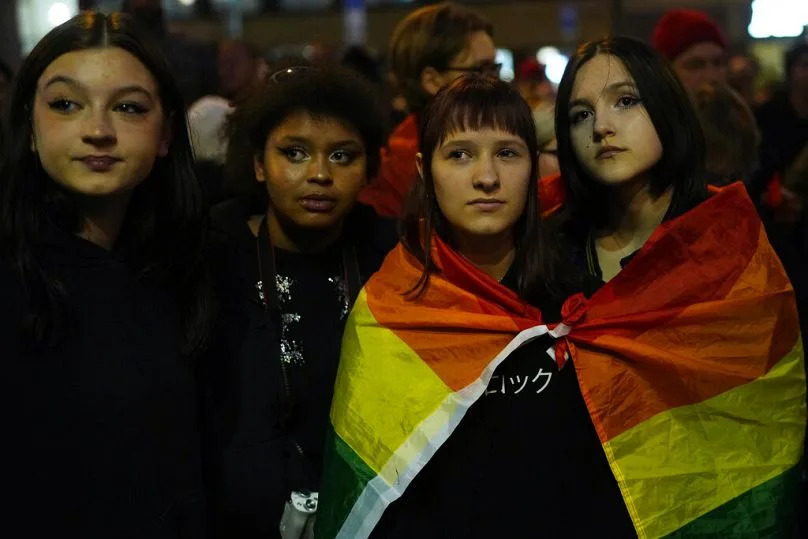Una Hajdari
Thu, 4 May 2023

The Czech Republic is one of the few European Union countries to continue to require a sterilisation procedure before a trans person can legally change their gender.
This, despite the European Court of Human Rights officially declaring such state-imposed requirements to be a form torture.
Leaders of the country were largely undisturbed by this comment, believing that legalising registered partnerships – as well as an interrupted attempt to legalise same-sex marriage – were more important to the LGBT community.
But with more and more European countries lifting the sterilisation requirement over the years, the Czech Republic remains the westernmost EU member state to still officially demand the procedure.
A bill has now been proposed by the Ministry of Justice to change this, despite the government's strong conservative leanings. The draft still needs to be passed by both houses of parliament and be signed by the president before it can be enforced.
“As far as I was told by insiders, there is support for this change in this government,” said Lenka Králová, an activist who also hosts a YouTube program on trans issues.
The sterilisation procedure requires the total surgical removal of sexual glands as a precondition for the legal change of one’s sex in personal documents.
Králová said that lawmakers are unlikely to have proposed this bill if it had not been “discussed first with the government’s coalition partners.”
‘Sexual activity is not our main motivation’
However, for her, the possible legal change will not change the biggest misconception about trans people in the Czech Republic – that they are “spurred by sexual desires," rather than wanting to transition because they feel inadequacy in the gender they were assigned at birth.
“In my opinion this goes down to a historical misunderstanding, that gender dysphoria is mainly motivated by sexual desires,” she tells Euronews.
Transgender people are widely misunderstood throughout the world, with even some allies of the lesbian and gay communities opposing more trans rights. The far-right has often portrayed the community as pedophiles or oddities who should be banned from most social activities.
“Traditional Czech views presented trans people as those who desire the surgical modification of their genitalia. Being trans on the other hand is all about life and sex is just one part of it,” says Králová.
While surgery is important for some, others would forego it entirely. “We are such a marginalised minority that up to recently our human rights were not an issue for politicians. Now that there are only a few countries in Europe that still require sterilisation, it gained their interest,” she explains.
In the Czech Republic you have to go to a sexologist if you want to start transitioning.
Kryštof Stupka, an activist and member of the government’s LGBTQ+ committee, says sexologists have existed in the country for decades and are “a combination of a doctor and a psychiatrist, but more generally they are a group of traditionally-minded people who believe sexuality has to be regulated.”
“And they played a key role in the process until now,” he continues, saying that while sterilisation has often been a requirement in the past “it began being reinforced in the new civil code in 2014.”
So when most countries in Europe began dropping the sterilisation rule, the Czech Republic rewrote their legal code to include more limitations on legal gender reassignment.

Thousands gathered in support of the LGBTQ community in Prague after two Slovak men were shot dead in Bratislava. 26 October 2022 - Petr David Josek/Copyright 2022 The AP. All rights reserved
‘They do not want trans people to reproduce’
THE PURPOSE OF STERILIZATION LAWS FOR THE MENTALLY CHALLENGED
Stupka explains that “most people in the Czech Republic assume that transitioning is getting plastic surgery to remove your penis or vagina. When in fact, what the sexologists care about is making sure you can’t reproduce.”
Once they are sure, as the law states, that you are “disabled from reproducing, once your body is destroyed, then you can have your papers,” he tells Euronews.
An average Czech citizen is required to show their ID regularly when they go about their daily lives – from buying alcohol to renting a car, to going skiing or signing a contract.
“You will be revealing your gender identity to people all the time, exposing yourself to their reactions or even harm,” exclaims Stupka.
Stupka explains that “most people in the Czech Republic assume that transitioning is getting plastic surgery to remove your penis or vagina. When in fact, what the sexologists care about is making sure you can’t reproduce.”
Once they are sure, as the law states, that you are “disabled from reproducing, once your body is destroyed, then you can have your papers,” he tells Euronews.
An average Czech citizen is required to show their ID regularly when they go about their daily lives – from buying alcohol to renting a car, to going skiing or signing a contract.
“You will be revealing your gender identity to people all the time, exposing yourself to their reactions or even harm,” exclaims Stupka.
Continuous hurdles
In 2017, the European Court of Human Rights ruled in the landmark Garçon v France case that “forced and permanent sterilisation” violated the inalienable right to self-determination, and that the requirement by the state to undergo these procedures is a violation of Article 8 of the Universal Declaration of Human Rights which protects the sanctity of private life.
Following the Garçon case, The International Lesbian, Gay, Bisexual, Trans and Intersex Association (ILGA) and Transgender Europe (TGEU) launched a complaint against the Czech Republic at the European Committee of Social Rights. The body found that the Czech Republic was in violation of the European Social Charter.
A bill was launched at the time to reverse the requirement – much like the one currently being discussed – but got shot down due to a technical issue, namely, the inability of the Czech citizens registry to process or implement this change.
“So the Minister of Internal Affairs at the time blocked it with an idiotic argument that the matrix within which we keep all the records of Czech citizens would not be able to process the legal gender change,” explains Stupka.

Czech Republic's Prime Minister Andrej Babis smiles at a ceremony in Prague. 21 August 2018
- Petr David Josek/Copyright 2018 The AP. All rights reserved
The previous Czech government was led until 2021 by the ANO or YES movement led by controversial media owner and populist oligarch Andrej Babiš.
“When Babis was elected he was initially pro-equal marriage, but then he turned into a Czech version of [Hungarian Prime Minister Viktor] Orbán,” Stupka explains.
While many welcomed Babiš being replaced by PM Petr Fiala and the center-right Spolu coalition, Stupka says there is even less support for LGBT+ issues and trans issues in particular in the new legislature, and that there is a lack of consistency from several consecutive governments.
The Czech Republic is widely considered one of the more progressive Central European countries, and its politicians and intellectuals played a leading role in the pro-democracy revolutions that led to the fall of communism.
This is why the sterilisation requirement sticks out like a sore thumb.
It is unclear how the trans bill will fare in parliament, but based on support for marriage equality Stupka believes that only “about 40 of them would support same sex marriage, while around 80 supported in the last parliament" of the 200 deputies of the lower house of parliament.
“But now that people finally see it as a gross human rights violation, maybe it the bill can pass and things will actually change,” he concludes.
The previous Czech government was led until 2021 by the ANO or YES movement led by controversial media owner and populist oligarch Andrej Babiš.
“When Babis was elected he was initially pro-equal marriage, but then he turned into a Czech version of [Hungarian Prime Minister Viktor] Orbán,” Stupka explains.
While many welcomed Babiš being replaced by PM Petr Fiala and the center-right Spolu coalition, Stupka says there is even less support for LGBT+ issues and trans issues in particular in the new legislature, and that there is a lack of consistency from several consecutive governments.
The Czech Republic is widely considered one of the more progressive Central European countries, and its politicians and intellectuals played a leading role in the pro-democracy revolutions that led to the fall of communism.
This is why the sterilisation requirement sticks out like a sore thumb.
It is unclear how the trans bill will fare in parliament, but based on support for marriage equality Stupka believes that only “about 40 of them would support same sex marriage, while around 80 supported in the last parliament" of the 200 deputies of the lower house of parliament.
“But now that people finally see it as a gross human rights violation, maybe it the bill can pass and things will actually change,” he concludes.
No comments:
Post a Comment